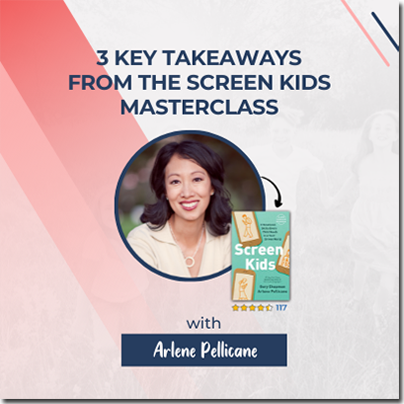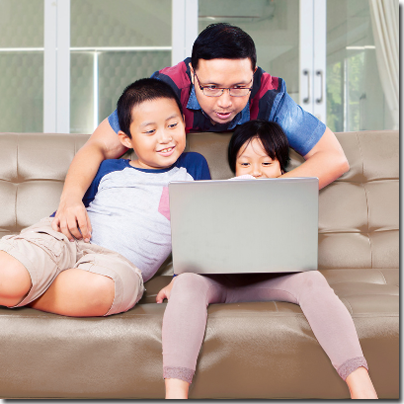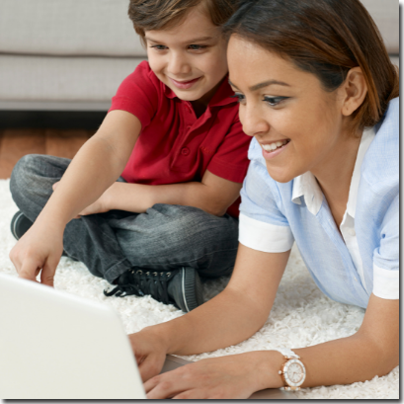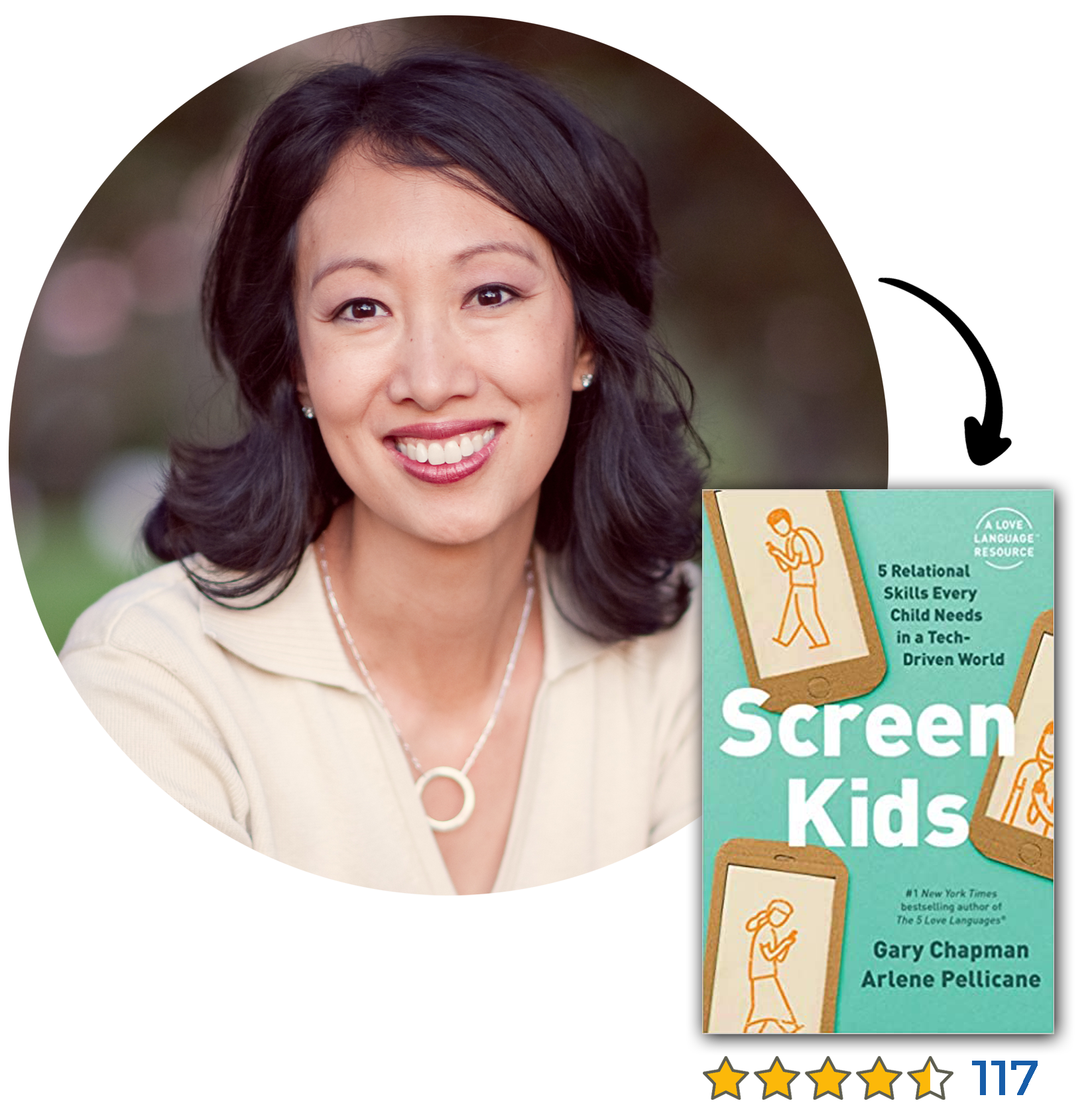 Is screen time a constant battle in your home? At the upcoming Positive Parenting Conference 2022, be sure to check out the Screen Kids Masterclass.
Is screen time a constant battle in your home? At the upcoming Positive Parenting Conference 2022, be sure to check out the Screen Kids Masterclass.
Based on the book Screen Kids: 5 Relational Skills Every Child Needs in a Tech-Driven World, this masterclass is an interview with Arlene Pellicane, one of the book’s authors. Arlene is a writer and a public speaker, and perhaps most importantly she’s also a mom of three beautiful children. So, Arlene absolutely understands the struggle.
I was lucky enough to be a researcher for this masterclass, and I was deeply impressed with Arlene’s knowledge, empathy, and expert advice. She has a wealth of insight into this topic and has such a friendly, personable way of educating and informing us that it’s easy to walk away with lots of new information and ideas.
While the Screen Kids Masterclass was packed with ideas, what really stood out to me was the reality check that Arlene gives on the impact of screen time on our child’s brain development, as that’s been a concern of mine since I first started letting my oldest child watch cartoons. Another growing issue in my own household has been anger management (for both my child and myself!), so I was also interested to hear her discuss the connection between screen time and anger management. But equally important to me was Arlene’s emphasis on the importance of books on building attention spans; we’re big readers in this household!
Ready for a glimpse into these topics? Read on!
#1: Screen Time Impacts Development
 Like most people who will be watching this masterclass, I have a child. I have two, actually. And as someone who loves video games, anime and movies, I have struggled hard with how to handle screen time in our home. I don’t want my kids to feel denied when all their friends get cartoons and tablets, but I also know that screen time is not innocuous.
Like most people who will be watching this masterclass, I have a child. I have two, actually. And as someone who loves video games, anime and movies, I have struggled hard with how to handle screen time in our home. I don’t want my kids to feel denied when all their friends get cartoons and tablets, but I also know that screen time is not innocuous.
That’s one thing that has really stuck with me from this masterclass: screen time affects my children’s brains. Arlene talks about studies that show how an excessive amount of screen time affects learning to talk, learning to read, and so much more.
Chances are good that you’ve worried about how screen time is affecting your child, too. Are they getting enough exercise? Will they struggle in school as a result? Will they be able to keep up socially and emotionally?
The good news is that while too much screen time does affect kids, as parents, we can play an active role in mitigating that. We can limit screen time. We can differentiate between “junk food” screen time and mentally healthier options. We can get our kids outside. We can ensure they’re getting time with friends and family and other children to develop social skills.
Not sure how concerned you should be about the impact your child’s screen time is having on their development? Perhaps now is the time to start tracking screen time a little more closely. As Arlene suggests, it’s always a good idea to think about what benefits, if any, our children are really getting from those games they play or that social media site they hang out on. Does this particular type of screen time help or harm? It’s time for us to start thinking more critically and respond accordingly.
#2: Recognizing the Link Between Screen Time and Anger
 One thing I’ve really noticed recently with my ten-year-old is that he struggles with anger. And one of the things that most commonly triggers an angry outburst is being told to put away screens for the day. If my kid isn’t ready to stop yet—he wants to finish the level he’s on, or he wants just one more episode please—then being told “all done” can be the catalyst for yelling, throwing something, or stomping off to his room.
One thing I’ve really noticed recently with my ten-year-old is that he struggles with anger. And one of the things that most commonly triggers an angry outburst is being told to put away screens for the day. If my kid isn’t ready to stop yet—he wants to finish the level he’s on, or he wants just one more episode please—then being told “all done” can be the catalyst for yelling, throwing something, or stomping off to his room.
And I know it’s not just my kid doing these things. Screen usage really highlights how much some children struggle with anger management.
Fortunately, anger management is one of the social skills that Arlene talks about in this masterclass; she focuses on how important it is that we help our children learn appropriate ways to deal with harsh emotions.
For me, Arlene’s interview reinforced my belief that while it’s normal and natural for us to lose our cool with our kids, it’s absolutely vital—and even a valuable example to set—when we take the time to apologize for it later. In addition, Arlene talks about other ways that we can model better anger management for our kids: moving to release energy, taking a pause to cool down before we react, talking side by side instead of face to face.
How do you respond when your kids blow up at you? How do you follow up when you blow up at them? Take some time to see if you can see any correlation between certain activities (like screen time) and anger issues.
#3: Use Books, Not Screen Time, to Increase Attention Spans
 My children are a study in contrasts. One is social and outgoing; the other is shy and reserved. One can play alone for hours; the other definitely prefers to be playing with someone else. But one thing they have in common is how variable their attention spans can be.
My children are a study in contrasts. One is social and outgoing; the other is shy and reserved. One can play alone for hours; the other definitely prefers to be playing with someone else. But one thing they have in common is how variable their attention spans can be.
I’m sure most conference attendees feel the same way about their kids. How come some activities can hold our child’s attention for long periods, while at other times we’re convinced our little ones will never be able to sit still long enough to succeed in school?
Attention is another skill that Arlene discusses extensively in this masterclass. And attention goes beyond just school. When our kids struggle to maintain attention, they may have a hard time reading or playing independently. This can follow them all the way through life and into their working lives.
But before you convince yourself that screens are ruining your child’s ability to focus, take comfort in some of Arlene’s thoughts. Her number one suggestion? Books. Get kids started reading early. Offer books constantly, at their level and tailored to their interests. Books teach kids to focus and to think critically, and those are skills they’ll need for life.
What kinds of books do your children like to read? Do they have ready access to ones that might encourage them to focus for longer periods of time? Perhaps a trip to the library is in order!
As you can see, this masterclass is full of fascinating information, and Arlene’s wisdom has had a real effect on how we approach screen time in our household. While it continues to be a battle to moderate the amount of screen time my child gets daily, we have started focusing more on the “healthier” digital options, because it’s so clear that screen time really does impact a child’s development. My son and I are working together to manage our anger, and we’re recognizing the link between anger and excessive screen use. We are also making weekly trips to the library because I now recognize how books are excellent for building attention spans.
This was an amazing masterclass and there were so many things that jumped out at me that it was really hard to pick just three takeaways! Arlene is just such a fascinating speaker and I know her ideas in the Screen Kids Masterclass will resonate with everyone who listens to her. What will you take with you after watching this masterclass?
 You can watch the full Screen Kids Masterclass with Arlene Pellicane for FREE during the online Positive Parenting Conference between May 17th – 24th, 2022. Each year 100,000+ parents join us for this amazing online event. Don’t miss it!
You can watch the full Screen Kids Masterclass with Arlene Pellicane for FREE during the online Positive Parenting Conference between May 17th – 24th, 2022. Each year 100,000+ parents join us for this amazing online event. Don’t miss it!
Up Next…
Do you have a teenager who struggles with anxiety? Have you ever wondered if your teenager’s odd behavior is actually anxiety rearing its ugly head?
Join us next week as we explore the ways that anxiety can manifest itself, both physically and mentally, in our teenagers, when we discuss key takeaways from the Anxiety in Teens Masterclass with Natasha Daniels.
This informative and insightful masterclass is packed with tips for recognizing anxiety and tools for helping your teen develop the skills needed to fight it. See you next week!
Leave a Reply